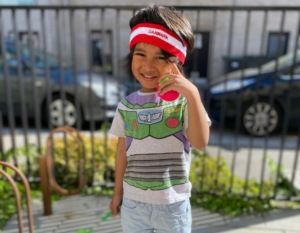Opinion
Copen’ with the kids: How The ‘S-Word’ Taught My Kid Danish
Kate Monteath
This article is more than 4 years old.

If I told you the S-word taught my kid Danish, you might jump to conclusions.
But no, not that S-word, but something almost more controversial – at least in the world of moms and dads. Screen time! I know, I said it. And there is probably some toe-curling Karen losing her wings out there right now, but really, it isn’t all that bad. If anything, screen time played a huge role in helping to settle my son into life here in Denmark.
First of all, I am not talking about sticking a smart pad in front of your child’s face 24/7 while they watch mindless content. It’s all about balance – but once you find it, coupled with other activities, screen time can be amazing for your child’s development.
The børnehave blues
Let’s head back to March 2021: my four-year-old son’s Danish vocabulary mainly consists of ‘ja’, ‘nej’ and ‘chokolade’. We have just come off more than two months of lockdown with minimal to no social activity – and it is his first time joining any kind of daycare setting.
It would be tough on any child having to spend most of the day with strangers, speaking a totally different language. And needless to say, we go through months of very challenging morning routines complete with tears, refusal to leave the house and bribery involving any candy imaginable.
There’s a new kid in town
Then one day, I did something that would jumpstart my son’s transformation. It was so simple that I can’t believe I hadn’t done it much earlier: I changed the language of all his cartoons to Danish – and there it was. EUREKA!
I am not the type to over-exaggerate, so when I say that everything seemed to change overnight, it really did. It started off small with him uttering the odd Danish word or phrase here and there.
Then soon after, I would catch my son having a Danish convo with his teachers. Or I would see him playing with his friends – in Danish! I was stunned. Not only was his Danish getting much better, his confidence was seemingly sprouting out of nowhere.
Go with what works
Something clicked that day his cartoons went from English to Danish. In under a month, my son’s brain was able to take his familiarity of the shows, its characters and stories, connect the dots and open up his understanding of this new language.
Of course, I also give his kindergarten teachers their due credit, as they have been instrumental in getting my boy to where he is today, but screen time helped facilitate and reiterate that learning at home.
But be responsible
AGAIN, it is all about finding that bal-ance, and in my experience, screen time can be a great little helper (see factbox).
The trick is to make it work for you and not against you.
By now, most parents know of the harmful effects of exposing kids to too much screen time. There are countless articles out there to scare you off handing your child a smart screen for anything – but I wanted to share a good reason to do it.
With the help of purpose-driven screen time, my son transformed from an anxious and shy kid to one of the goofiest and loudest in the bunch at kindergarten. So, if my boy has a little more screen time than what is considered ‘appropriate’ by frowning no-sayers these days, I can totally live with that.

About
Kate Monteath
A former kids radio host and now head of content for a leading family activity guide, Kate is back in DK with her backpack full to the brim of experiences. With her basecamp set up in Copenhagen along with hubby and son, she is on the topsy-turvy journey of what you call parenting. Follow her on Instagram @katemonteath










































